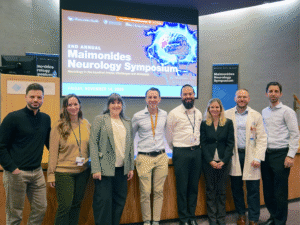Erica Hutchinson, Ph.D., Director of Behavioral Health, talks about how to deal with burnout resulting from work. Join us as she reviews symptoms and the steps you can take today to start healing.
Listen on Spotify, Apple Podcasts, or iHeartRadio.
Joey Wahler (Host): It’s a mental health condition connected to our work, so we’re discussing job-related burnout. Our guest, Dr. Erica Hutchison, she’s Director of Behavioral Health, Department of Academic Affairs at Maimonides Hospital. This is Maimo MedTalk. Thanks for listening. I’m Joey Wahler. Hi there, Dr. Hutchison. Thanks for joining us.
Dr. Erica Hutchison: Thank you for having me. I’m glad to be here.
Host: Great to have you on board. So first, what exactly do we mean by work-related burnout?
Dr. Erica Hutchison: That’s a good question. That’s a big one to start with. I think that, in considering burnout, I can give the kind of overall definition and what are the ways to notice and kind of categorize burnout. But I always like to say first that this is really like an occupational risk for anybody who’s working in a high-stress job. And particularly for anybody working in healthcare, we know that there are higher rates of burnout for folks working really in any position in a hospital setting or any kind of clinical setting. I like to bring this up first to say that because it’s kind of expected, it doesn’t mean that if we’re feeling burned out, we’re not doing a good job or we’re not qualified for the job. It just means that, well, this is something that is typical and even kind of normal and to be expected, so to try to reduce any kind of self blame or stigma around burnout. It’s something normal. We are all likely to experience it. And there’s lots that we can do about it too.
Host: So having said that, just how common a problem is this?
Dr. Erica Hutchison: I think that it’s, you know, depending on the particular discipline that someone is working in, the numbers are going to look a little bit different, but we do know that for more of the clinical folks, so people who are PAs and nurses and physicians and every other kind of clinical kind of patient-facing role, the rates are higher for them than people working in other kinds of settings. And I think it goes for people who work in environmental or who work in food services. Really, it’s a hard thing to be working in a hospital because of, you know, the high demands and, you know, we’re all there to help people, whatever role we’re in, and that can take a toll on us too.
Host: Absolutely. So, what’s the difference between feeling common stress at work and suffering burnout?
Dr. Erica Hutchison: In order to meet the criteria for burnout in the more kind of diagnostic way, there are three categories of symptoms. And so, I’ll just very quickly list what those are. So, we’re on the same page. So, the first is feeling fatigued. It can be a physical fatigue. It can be emotional fatigue. Often, it’s both, but having some kind of effect on our overall energy. That would be the first category of symptom experience.
The second category is having a more cynical or negative outlook that’s different than what’s our typical way of looking at things. This can also look like being a bit more detached in general, feeling less hopeful about how things are going at work, but also just in general, because again, even if we are affected mostly by stressors and things happening in the work setting, we are not different people at work than we are at home. So, it does go back and forth. So, the negative outlook can be, kind of overall, not only related to work. So, that’s the second category, that more cynical, negative outlook.
And the third symptom category is a feeling of being ineffective or not very good at our jobs, not performing well. And what’s important about that one is that it could be true that our performance goes down, but not necessarily. It might be that we’re doing fine, but feel as though we’re not doing enough or we’re a little bit more critical of ourselves, whether or not that’s actually matched by the people around us.
Host: Gotcha. Now, you work with residents at Maimonides. So, tell us a little bit more about what you do.
Dr. Erica Hutchison: Sure. I have a pretty special role in the hospital. I’m glad I found the role, because it’s not something that every hospital has. So, I’m essentially a full time clinical psychologist hired to support residents and fellows throughout their training. And the reason that this position exists at Maimonides is because my department, and I think the hospital in general really wants to make space and prioritize the health of the employees. And this just goes back to what I was saying before, there’s so many things that are rewarding, but also tough about the work that we’re doing in the hospital.
So, I provide individual counseling for residents to help them identify coping strategies or just to better understand what’s going on for them to understand the emotional impact of the work that they’re doing to help them manage the stress of sometimes traumatic incidents that they might be involved in or might see so that they can continue to do the work that they’re here to do.
So, I do a lot of individual counseling with them. I also do some other more preventative kind of projects. So, we’re right now in the onboarding season for all the new residents. We’ve got about 150 new people coming on, which is very exciting. And so, I meet with all of them for a one-on-one meeting to think ahead of time about what is likely to be stressful for them in working at the hospital. What do they already know about themselves in terms of predisposition towards burnout or anxiety or stress, and to try to put some things in place in a proactive kind of way, and to get them to just start reflecting and thinking about their whole experience in working at the hospital, not just patients, not just their performance, but them as whole humans. And then, I also have the opportunity to work with staff throughout the hospital, not only residents, as I’m involved in a few hospital-wide projects, including something called psychological first aid training, where I’ve developed this curriculum with my colleague, Amish C. Aghera, who is the Head of the Simulation center in the hospital and also an emergency medicine doc. And we basically developed this training to help teach staff in any discipline how to offer basically peer first aid, peer support to colleagues who are a little bit stressed or maybe just having a difficult day. So, we teach really practical strategies so that, while we have people like me and other more official kind of supports for staff, you know, everybody in the hospital has the capacity to support each other too.
Host: Based on what you just said, a lot of that, it seems, has to do with being proactive on the part of you and yours. How important is that? How important is it to let employees know beforehand, “Hey, these are some issues that could come up. Here are some things to watch out for, and we’re here to help if need be.”
Dr. Erica Hutchison: Yeah. I think that, in terms of really any health condition, and I would imagine most of the experts that you’ve spoken to would say something pretty similar, that prevention is always easier and better than an intervention when it’s possible. And so, I think that having a few things in mind in terms of burnout is really pretty essential in trying to take care of ourselves. And so, one is just knowing, as I started off with, that this is a totally normal thing, that people that work in hospitals, and again, in other areas too, but it’s a normal thing that we can experience. And so, we should be kind of on the lookout for it.
And so, I feel pretty strongly that knowing some of the signs of burnout, knowing for ourselves what tends to change for us individually when we’re getting a little bit more stressed or a little bit more burned out is really, really helpful and being able to catch it as soon as possible and maybe make a little bit of a pivot, add in some additional strategies, maybe adjust our routine in some way. So, I think having that knowledge of, “Well, what does burnout look like?” And then, the self-reflection of, “Well, what does it look like for me and what can I specifically be on the lookout for?” Those are two really important things, and, you know, this is part of why I love having conversations about burnout and just workplace stress in general and the typical things that we all experience at the hospital that it’s just emotionally challenging or logistically challenging, you know, people come to the hospital for care, not because they’re having the best day possible. They’re there because they need help and are coming with their own set of maybe burnout and stressors and emotions, and we’re all there as staff to try to support them too. So, it’s a lot to be dealing with. And that way just knowing, “Hey, this is normal” and we can preempt it if we’re on the lookout for it. I think that’s really important.
And the other thing is that knowing what helps us to enjoy the work that we’re doing ahead of time is a really helpful preventive practice as well. I think oftentimes it’s easy to focus on when things are not going well, that’s pretty easy to identify often. And we might forget to think about, well, you know, I know what it looks like when I’m not doing well, but what does it look like when I am doing really well, when I am really enjoying the work that I’m doing? What is it that’s brought me to the position that I’m in now?” And so, this could be things like looking for chances to connect with our professional values. Like for me, I know that when I’m feeling really curious, I feel most connected to my work and I feel like I am doing my best work and I feel most like myself and I feel more energized. That’s a particular value that I like to, you know, keep in mind and look out for. But also things like how we communicate with our colleagues and leaning into opportunities that help us to learn something new or challenge ourselves or catch those moments where we feel really appreciated by the people that we’re working with. All of that stuff is great because it helps us to keep our health baseline, you know, maybe where we’d like it to be. But it’s also really good to know what those things are so that when we do start to feel a little more stressed or a little bit more burned out, we already know what kind of works. We already know what we can re-anchor ourselves to. It’s much harder to learn a new strategy when we’re already pretty stressed or pretty burned out.
Host: So, what does work burnout typically look like? And at what point should someone maybe consider seeking professional help for it?
Dr. Erica Hutchison: As I mentioned, work burnout, it is a combination of those three categories. So, feeling fatigued, feeling less effective or even as though we’re enjoying our jobs a little bit less, and that more cynical or negative outlook. And this exists on a spectrum. So, all of us right now are on the spectrum somewhere from not very burned out to maybe particularly burned out. And so, it can shift depending on, a lot of different factors.
I think that, for burnout, something important to keep in mind is that it’s not really possible to get burned out after a couple of bad days. We might have a few stressful days, and that can certainly have an impact on us on how we’re feeling, on our outlook. But burnout is really considered to be a syndrome, which means that it builds up over time. It is not like having a cold, for example, for a few days. And so, something really helpful to keep in mind and to check in with ourselves about is how long have I been feeling this way? Is it getting more intense as time goes by? Is it only certain days that I’m feeling, you know, stressed or frustrated or less connected with my work? Or is it pretty consistent most of the time? And is it continuing? So, I think that’s something that can really help to differentiate from the typical kind of, you know, today’s been a stressful day. There’s, you know, particular annoyances or frustrations or challenges from something that is leaning more towards a burnout kind of presentation.
Host: So, what treatment options are there for those feeling burned out at work?
Dr. Erica Hutchison: I think some of the good news for burnout is that there are, of course, more official kind of treatment options, meeting with a mental health provider who specializes in burnout or is particularly familiar in working with healthcare staff can be super useful. But there are also many other things that we can do on our own to help combat some of the burnout symptoms. So, I think that’s nice. And I like to point it out because part of feeling burned out is often related to having feeling like we have less agency or less control or things are kind of hopeless. So, anything we can do to increase our sense of our ability to take care of ourselves is automatically going to be helpful.
So, in terms of things that we can do on our own, I do want to highlight another important kind of like a criteria or a defining factor of burnout, which is that burnout is not only an individual challenge that a person is having. It is always to do with the fit between a particular individual and the work environment that they’re in. And what I mean by that is, if we think about the job that we have now, we can consider, all right, things like our values. “Are my values similar to the values of the place that I’m working? Is my communication style, the kind of community that’s important to me, the way I interact with my colleagues, is that similar to the way that all of my colleagues around me are doing things? Is the type of work that I most enjoy the type of work that is available to me at the hospital?” And so, burnout happens when there’s a mismatch in some of those categories. When what we’re showing up with, what we’re interested in, what’s important to us is not as available in the workplace. And this I think is important to highlight as well, because sometimes it can feel like, well, burnout is something that the individual needs to work on their own. The individual might feel like, “Well, this is something that the hospital or that the workplace has to fix.” And the truth is that it’s kind of both. And so, there can be intervention strategies that are both individual, but also more related to that fit between the workplace.
And so, what I suggest to people when they are feeling burned out, when it’s clear that it’s been happening for a while, it is not reducing after just a couple of days, and that the experience is really getting in the way of experiencing work in a way that is meaningful and fulfilling for the individual, I will ask them about, you know, this question that I had brought up before, “What is it that you used to like about the work that you were doing? Or if you think about a time when things were more fulfilling or you were more energized, or you were more at your typical kind of baseline, what was going on there? What was helping it to feel that way?” And so, I will work with people to kind of creatively identify, “All right, Is there a way for you to find just one moment during the day where it feels like you are helping in a way that’s meaningful for you or that you’re able to connect with some of those values that you have?” And sometimes, we have to even just start with well, what are the values that is important to you? What kind of collegial relationships would you say are important or meaningful or what you want to be striving for? And so, that’s part of why, as I said before, it’s good to know those things ahead of time. But even if you don’t, it’s still possible to reflect and identify, basically, things that we can put some energy into reconnecting with. That’s often where I start with.
Before that, because some of those questions can be a bit abstract, I will ask people to think about their routine when they’re at the hospital and to consider are there any small things that they might be able to add to the routine to take an extra pause during the day, to build in a moment of something small to take care of themselves, to try to increase the energy that they have while they’re there, to battle a little bit of that fatigue that they might be having. And this has to be really individual-specific. I think that sometimes the kind of anecdote or the prescription that’s out there for things like burnout or workplace stress is really offered as a one-size-fits-all, like, maybe doing yoga or taking a walk outside or drinking some water, having a snack, all of those things could be helpful, but they’re not going to be equally helpful for every person. And so, it’s really important to kind of reflect and consider what we know about ourselves and what is going to be, one, the lowest hanging fruit, the easiest thing for us to grab first so that we can build up our motivation and momentum to do a next, maybe a little bit harder thing, and what is most likely to work for us too.
Host: So, in summary here, Dr. Hutchison, what’s your message for those listening that may have work-related burnout about the chances for it being effectively addressed?
Dr. Erica Hutchison: My overall view is pretty hopeful. And in the work that I’ve done, and also thinking about myself, I’ve certainly experienced burnout and friends and colleagues I know have experienced burnout and many of the people that I work with professionally too. And I have seen in many, many cases that it’s possible to reverse burnout, to apply strategies that are not necessarily so complicated, but can be really effective. And that’s also part of why I really wanted to highlight before, it is helpful to meet with a mental health professional to work through some of these things. But it’s not necessary. A lot of the interventions for burnout are things that we’re able to do on our own.
So, further, I think really small things often is the best prescription that I would suggest too. Oftentimes, I’ll hear from people that they’re not feeling so great. They might be on the higher end of the spectrum for burnout or even just kind of general workplace stress, and they might have really lofty goals or expectations for, all right, they have to get back to their hundred percent or they will identify the goal of, I don’t know, adding three or four really time-consuming coping strategies or self-care practices to their routines and then often, end up finding, well, maybe that wasn’t so possible and feeling even kind of worse in the end.
And so, my biggest piece of advice is to find the thing that’s the lowest hanging fruit and the thing that is most likely to give you the biggest boost right away. And that’s good enough and doing that for, you know, a few days builds up our capacity to add maybe another thing, and the process to get to burnout takes a while. As I said, it’s not just a one or two-day thing. And so, the process to kind of move ourselves back down the spectrum is going to take a little bit of time too, and that’s totally normal and, again, not a reflection of how qualified or how skilled or how good of an employee or a colleague they are. It is just part of the landscape of working in a hospital. So, I want to try to reduce self-blame from that perspective too. It’s just part of the deal. It’s something we all need to be thinking about.
Host: Sounds like great advice. Well, folks, we trust you’re now more familiar with work-related burnout and how it can be addressed. Dr. Erica Hutchison, thanks so much again.
Dr. Erica Hutchison: Thank you.
Host: And to make an appointment with Maimonides’ Mental Health Services, please call 718-283-7800. For general information or to hear more Maimo MedTalk episodes, please visit maimo.org. If you found this podcast helpful, please share it on your social media. I’m Joey Wahler. Thanks again for listening to Maimo MedTalk.







